Are Beans Considered Meat Funny Unan
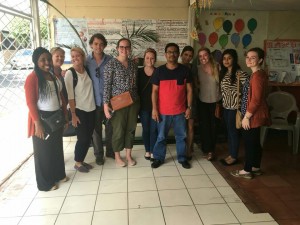
On Saturday morning, the group had an emotional departure from León and our host families. After a quick lunch and recoup period, we headed out to meet Julio Cesar Mena, the Executive Director of an organization working on HIV/AIDS prevention, education, and human rights in Nicaragua. He first gave us a quick rundown of the climate of HIV/AIDS in Nicaragua and the stigma around the disease in his community. Julio also shared his personal testimony about how he contracted HIV and his struggles with the disease since.
During the Nicaragua revolution in the 1980s, Julio was a 17 year old soldier in the military. He was severely wounded and dying when a friend gave him a blood transfusion to save his life. In the early 1990s, he tried to donate blood at Red Cross when they denied him and sent him home. Later, men came in hazmat suits to his home and carried him out on a stretcher, tied down. Julio mentioned that he vividly remembers all the neighbors coming outside to watch. It was obvious to them that something was wrong. That was the beginning of his constant struggle with the disease and the stigma associated with it.
It was Valentine's Day. He was sitting alone in a hospital room when he asked a nurse for water. She came back with a disposable cup and the doctor followed her in. When the doctor came in the room, he told Julio to sit across the room and not come near him. That was when the doctor told him he was HIV positive and only had 5 years to live.
He was taking 90 pills a day. 30 at each meal.
He could no longer find a job.
His daughter ended up being infected and dying from liver failure.
She died while he was holding her in his arms.
His wife left him and moved to Miami.
He became an alcoholic and drank for 3 months straight.
He was hospitalized and in a coma for 12 days. He left the hospital weighing 60 lbs.
His family started planning his funeral.
They stored his coffin under his bed and ordered all the food.
The family served him meat for every dinner and spoiled him.
No body had any faith he would survive.
The night before the 5 year mark, he thought he would die in his sleep. The next morning, he was afraid to open his eyes because he was sure he had died. When he heard the roosters crow, he asked himself "Are there roosters in Heaven?" Then he finally realized he was still alive and he had new found hope.
It took him a while to realize how he had even contracted HIV. The common myth is that it is through sexual contact rather than drugs or anything else in Nicaragua. He recalled his family asking him first if he was gay or a sex worker. When he realized it was his friend from the war, he immediately wanted to find and kill him. He found an address for him in León. He went there only to find the man's mother. She told him he had moved to Honduras for good. When Julio asked her to call him and tell him that he was there and needed to warn him about having HIV, the mother instantly began crying. Her son had died in Honduras from symptoms related to the disease. That was satisfaction enough for Julio.
After that, he began this organization to educate others and prevent the further spread of HIV. Today he is married and has another daughter. He now only takes 16 pills a day and has a better reason to wake up every morning. Through the organization, they have been able to test hundreds of thousands of people throughout the country. They provide education and other resources to communities at greater risk and were even able to prevent the further spread of the disease in a smaller community when one person came forward. He has built incredible relationships through his organization and his life has great purpose. You could tell that what he does now, because of his experiences, has made a huge impact in the uncountable lives of Nicaraguan people.
Take away thoughts form this experience:
1. Take a moment to know to people's story. We never know what someone has struggled through and it is important to always take that into consideration before judging them.
2. Do your research and know your facts. Even the doctor was nervous about being close to Julio due to misunderstood myths about HIV/AIDS. It's important to consider their feelings and show love to everyone despite, and especially be share, of their struggles.
3. Don't fall victim to the stigmas and stereotypes around you. Specifically, do all that you can to counter them and dismantle them in your society.
4. Even through hard times, find a reason to wake up in the morning. Don't let the world get the best of you. Use your struggles, learn from them, and make the world a better place because of them.
5. Be strong. Never lose hope.
Mucho amor,
Anna Lunsford & Emma Timan
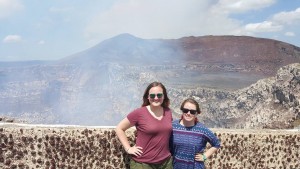
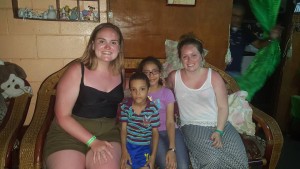
This week, we had the opportunity to leave our hotel in Managua and have an authentic Nicaraguan experience with a host family in Leon. By living in the community of a family, we were able to integrate ourselves into a new culture even if it was only for a brief time. When we arrived in Leon, many of us were nervous because we did not know what to expect and the language barrier would surely be a challenge. Although some people spoke Spanish, others were very limited in their ability to verbally communicate but they were able to adapt throughout the week and they were interested in learning some basic Spanish.
When we arrived at the university we got to hear the perspectives of social workers and social work students and it was fascinating to hear their perceptions of Americans. When asked what they thought in terms of American culture, one student referenced the American Pie movies. They asked us what we thought about Nicaragua thus far and we responded by saying we felt very welcome. Then, we met with our host families and began the awkward first stage of what would become a very meaningful relationship. We were welcomed in their home and they went out of their way from the start to make sure that we were happy and comfortable. Xiomara, our host mom bought us cokes and moved the fans around so that we would stay cool in whatever room we were sitting in. Victor, our host dad spoke with Emma in Spanish for hours and expressed his opinions about Nicaragua. Later, our host brother Ivan and our host sister Alexa came home from school. At first, they were very nervous and hesitant to approach us but by the evening, Ivan was showing us all of his Lightning McQueen toys and Alexa was asking us to teach her some English. We were able to bond quickly with the whole family.
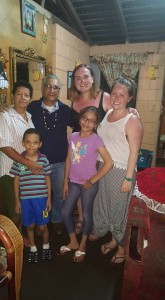
Beyond our immediate host family, we also had neighbors downstairs who we became very close with. Sandra and her granddaughter Brittany became friends of ours and we were eager to play and laugh with them each night on their patio. Brittany was so smart and sassy that she constantly had us all laughing. Ultimately, our time in Leon led us to new experiences whether that was salsa dancing, surfing at the beach, or just falling in love with the Nicarguan people. We are so grateful for all of the hospitality and love that we received from our family this week and we know that our experience in Nicaragua would not have been the same without this new relationship and all of the knowledge we gained from our new friends.
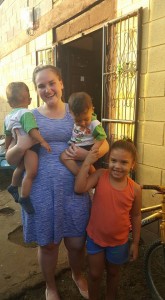
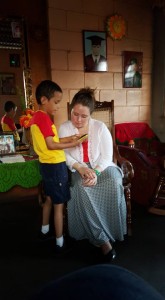
Some things to consider for our return to America and your life there now:
1. Be welcoming and be kind. Our host family was so incredibly hospitable. They went above and beyond to make purified ice for us, always filled our water bottles without us asking, and told us they were honored to have us when we had to say goodbye. They were extremely sweet and did more for us than we ever imagined they would to make us feel comfortable. We think Americans should learn a quick lesson from this and always remember to make others feel as welcomed, loved, and cared for as possible.
2. Be content. The family's home was small, crowded, and perfect. The living room where we spent most of our time was probably 6 ft by 10 ft and it often had 4-7 people in it. The walls were covered in pictures of the family and the furniture was crammed where ever it would fit. Little Ivan would bring out his toys to play for a while then quietly put them back and grab the next from a bin in his room that he shared with his sister. We learned that space is not as necessary as Americans think and that we have the capacity to be happy with exactly what we have.
3. Focus less on material items and more on people. Seeing the way that our family interacted with each other and their neighbors and even strangers buying juice from their porch really showed us how important building relationships is. In the era of technology, kids are focused on IPads and Instagram, not the cute little girl next door. They aren't playing "truth or dare" with a dirty water bottle on the patio or drawing sweet pictures of snails larger than houses. We need to realize again how important and fun having close friends can be.
4. You don't need to speak the same language to laugh with and be accepting of others. Americans are often focused on the idea that everyone who lives or moves to the US needs to speak English and speak it well if they want to stay. Our family and everyone we have met in Nicaragua has been so patient and understanding as we struggle with the language barrier. We will definitely re-enter the US with a new perspective for immigrants and those who don't speak English as their first language.
5. Even SPF 100 doesn't work down here.
Thanks for reading!
Mucho amor,
Emma Timan and Anna Lunsford
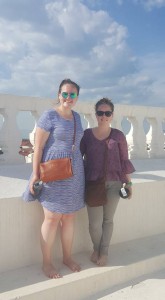
Ashley:
We're reaching these close of an incredible trip. No day was the same and the days were never predictable, no matter what the itinerary said. Each day has held something new- new organizations, new understandings, new perspectives, and new sights. It has been difficult for me to write for most of the trip. At the end of every day I have been thoroughly exhausted physically, mentally, and emotionally. This kind of exhaustion can be cleansing, but has often left me feeling overwhelmed and with no words to accurately describe my experiences. Our first night of our homestay (day three of our trip), I asked Ishrat how we would take our experiences back with us when we left the country because it is my perspective that if we only come to the country for the excitement of telling others about all the places we've been, the impact of all the lessons learned have been lost. We reflected on why we wanted to initially come on the trip, what were hoping to gain from it, and finally, how we wanted make an impact from our experiences. Much of our discussion centered on understanding people and their experiences better, growing as individuals, and making connections that could not be made in the same way is classroom. This conversation has helped me to stay centered on the trip and my intention is for it to carry over after we arrive back in the States as well. We have met and listened to so many resilient, strong, and hopeful people.
Things I am reflecting on:
Political corruption
Distribution of power, access to power
Growing inequality
"And I continue to struggle." -Julio Cesar Mena, works with HIV and AIDS THEOUGH THE ANICP and SIDA organization, HIV+
"My name 'Juanita' is just a name. I face discrimination not just because I am a woman or just because I am a transwoman. I face it for both, because of what I (my body) represents to people- neither man or woman." -Juanita Urbina, member or La Corriente, a feminist LGBTQ organization, transgender woman
"And I continue to struggle." -Community organizer, affected by renal disease, faced the death of family members and thousands of coworkers
Culture of health and prevention rather than reaction
Sustainability- of programs, of agriculture, wholistic sustainability
Solidarity, Revolution
Invisibility of poverty
Inter-country development, communication
Personal combination of social work, public health, social justice, and human rights into all that I do
Ishrat:
During our study abroad, we visited several organizations throughout Nicaragua that exposed us to the reality of this country. Nicaragua is beautiful for its culture and people, but the country continues to face social, economic and political issues that needs to be looked at more carefully.
One of the social issues in Nicaragua is discrimination against transgenders. On May 16th, we visited Juanita Rubina. Juanita, once Juan, is a transgender woman who went through a transformation from a man to a woman. She spoke to us about her struggles in the Nicaraguan society and how people mistreat and look down upon not only the transgender community but also the LGBTQ community. She came out at the age of 11 and has been facing discrimination to this day. From Juanita, I gained a new perspective of what discrimination feels like. She could neither fall in the category of a male or a female in the society because of the way she looked. And she faced even more discrimination in the appearance of a women, as usually many Nicaraguan women are overpowered by men. It is unfortunate that I have to say this; I believe things will change but it will take time. People have to understand that each one of us is different but we are all humans. We have to learn to give the same respect to others that we want to receive.
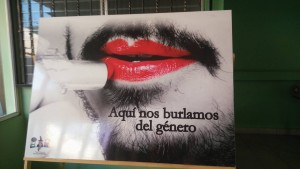
On May 20th, we visited Cafe De Las Sonrisas and I left the place with a little more inspiration. Antonio, the founder of the organization was the one speaking to us at this meeting. Antonio is from Spain and came to Nicaragua as a tourist. He fell in love with the country and has been in Nicaragua since then. He said "I fell in love with this country and got my heart broken." He loves the people and culture of Nicaragua but is heartbroken by the fact that there are a lot of issues in the society.
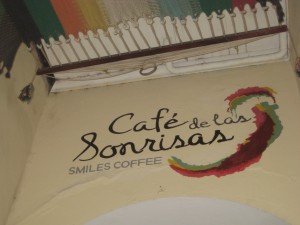
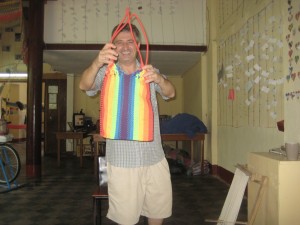
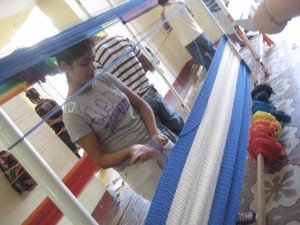
His restaurant/organization, Cafe De Las Sonrisas grew out of the idea of creating jobs for young people with disabilities to learn how to work in a restaurant and also learn skills such as hammock making. I was inspired by his ideas and how well he followed through them. He mentioned many times "Be a North American, do without thinking, and do it right away." As bad as it sounds, I think being impulsive can sometimes turn out to be good if it is something you are passionate about and you follow through it successfully. Because he wanted to create jobs for people with disabilities and give them the dignity they deserve, he followed through his plan right away and that is why he is where he is right now.
He believes that people with disabilities are capable of so much more than what society gives them credit for. I found similarity with Antonio in the outlook that all humans are equal and that no one should be treated any more or less than others. People with disabilities are capable of doing and achieving whatever they want but it is up to all of us to give them that chance. It is our responsibility to allow them to be humans, make mistakes and grow from it rather than treating them like people who are incapable.
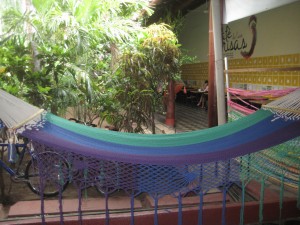
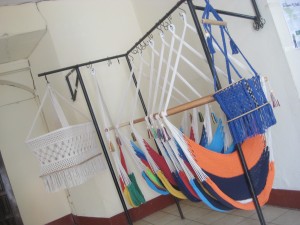
I am not saying all of this just from hearing Antonio speak to us. I was able to see first hand of their hard work on making the hammocks. They are truly people just like us with brilliance, intelligence and capability. One of the very last touching moment I had on this trip was a small activity one of the waiters had us do. He gave us ear plugs to put in our ears as we ate our dessert. I had not been in pure silence for a while, so the earplugs were certainly calming and peaceful. But a few seconds later, I experienced the sad reality for those who are unable to hear, those who are deaf. It was definitely a bit of an emotional moment for me as I thought to myself how can they stay in this silence for their entire life if I can not even handle it for a few minutes. This activity definitely impacted me in that I will never look at another deaf person the same way. I will be not only more understanding but also know that despite their disability, they are people capable of anything!

Cafe of SMILES 🙂
Thanks for reading and stay tuned for the next blog!

Hola, buenas tardes! Our names are Abby Wocher and Lauren Jesch. Abby is a third year Nonprofit Management student with an interest in international human rights. Lauren is going in to her fourth year as a Political Science major with minors in Nonprofit Management and Middle East Studies. We both decided on this particular trip as we have a passion for social justice and advocating for human rights.
The two of us just returned to Managua, after our three night stay in the beautiful city of León. Here, we had the opportunity to stay with a host family that CGE paired us with. The host families were all involved with social work in Nicaragua (current students, family members of students, professors, professionals in the field, etc.). Neither of us can speak nor understand Spanish very well and we realized this prior to the study abroad; therefore, we expected the few nights in our the home stay to be quite the experience…and we were right. If we could choose three words to describe our stay with our specific host family they would be: challenging, gratifying and humbling. We had the honor of staying with the Espinoza family: Ruth – the mother, Juan Calero – the father, Maria Fernanda and Natalia – the daughters. Ruth and Juan Calero were both professors at the UNAN, the University of Social Work in León. Both were very passionate about educating their students and the community about the importance of social work and the impact that it can have on society. Maria Fernanda is 15 years old, while little Natalie is 10. Ruth and Juan Carlo spoke/understood little to no English, so we relied on the daughters to help us translate if we were really struggling (Google Translator also came to our aid on plenty of occasions as well).
We were immediately welcomed into their home with open arms and minds. We were both anxious and nervous when waiting to find who we would be paired with on Wednesday, but the emotions were quickly calmed after the first night due to the family's generosity and patience with us. Their house was quaint, but offered us what we expected and so much more. Despite the fact that we struggled to formulate sentences and questions, we still enjoyed one another's company and found ourselves laughing and communicating in any way that we could.
We do not know how or if we will ever be able to thank the Espinoza family enough for their hospitality and kind souls, but we promised each other that we would never forget the experiences we shared inside their home and the city of León; furthermore, that ultimately we would continue to advocate on behalf of human rights wherever life leads us.
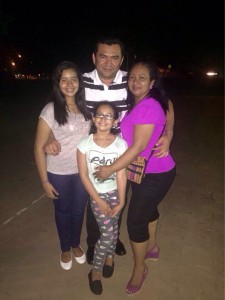
In conclusion, we would like to take this moment to reflect on the three words we chose to describe our adventure in León.
1) Challenging: The language barrier, the heat, the different foods as well as customs, and the time. We managed to communicate somewhat effectively due to both of our efforts in finding new and simple ways to speak (not conjugating verbs for example…since that was a skill neither of us had brushed up on). There was no air conditioning so we relied on each other to keep the energy up and to tolerate the heat together with the family, as they were constantly sweating too. When ordering food there were often things we had never seen or heard of before so our taste buds had a new experience also. Time was of the essence so we were constantly trying to make the most of every moment. We joked that our family also ran on their own time, because we were also slightly late when it came to arriving at the correct times on the itinerary.
2) Gratifying: There was a certain kind of satisfaction that we both felt after the home stay. We realized that we were still able to build relationships with several members of the community despite the inability to mutually understand each other's language. You cannot fully comprehend another culture until you are totally immersed in to it. We do not believe that we would have been completely exposed to Nicaraguan family interactions, daily activities, or lifestyle in general had we spent the whole trip in our hotel.
3) Humbling: Taking a step back from the lifestyles we lead back home allowed us to appreciate the simplicities the families find so much happiness in. Emphasis is not put as much on the materialistic items that Nicaraguan people don't have, but instead placed on what they do. Members of the community take pride in their homes and families as they have worked so hard to obtain all that they have. It isn't uncommon for Americans to have an individualistic mindset, but it is truly refreshing and humbling to see such a united and collective mentality among the families here in Nicaragua.
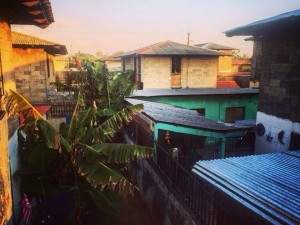
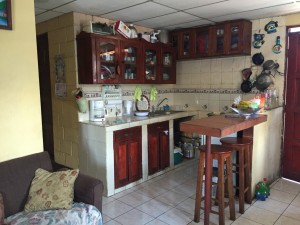
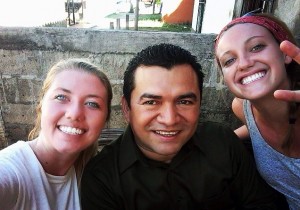
Hello! My name is Ishrat and I am a junior at The Ohio State University majoring in International Studies with a minor in Human Rights. My roommate, as well as my partner for this blog is Ashley Short. Ashley will be a third year senior this Autumn, majoring in Social Work with a minor in City and Regional Planning. We are on our study abroad trip in Nicaragua, sponsored by the College of Social Work at OSU. Our program's focus is social issues and human rights in Nicaragua. We are visiting several organizations in three different cities in Nicaragua to learn about the social issues and human rights issues that is taking place in this country. In this blog, we will be sharing our experiences and what we are learning from this trip. So let's begin!
Ishrat:
We were faced with a blast of heat the moment we stepped out of the airplane and that is where our two week journey in Nicaragua began. After recovering our luggage, we met our tour guide, Cesar. Our van arrived in fifteen minutes and we were soon on the way to our hostel in Managua. Managua is the capital city of Nicaragua. If you ever visit Managua, you will learn that this city is noticeable for its colorful steel tree displays that span across a good amount of the capital.
A wonderful incorporation in our study abroad itinerary are the home stays. I have been looking forward to the home stays since the day I learned that we would have this opportunity. During our first day in Managua, we visited Mark Lester at CGE(Center for Global Education) to learn about the political and and economic situation of Nicaragua. Over just about one and a half hour,we were better informed on Nicaraguan history and how the country has gotten to where it is currently. In the afternoon, we had chicken, rice, Pinto beans, stir fried vegetables, and fruits for lunch at CGE. I have to say that I was a little surprised to see that this center had chefs and a kitchen to cook for groups that visited, when I thought it was only used for office or classroom space.
After a day in Managua, we packed for our home stay in Leon. Suggested items to bring were mosquito repellent and a mosquito net since we were staying in a rural area. Our drive to Leon took approximately two hours. Once we got to Leon, we were greeted by friendly staff at the National Autonomous University of Nicaragua or UNAN. UNAN is a state funded public university in Nicaragua. It's second campus is located in Leon and that is where we were introduced to our host mother Gloria, for the three days we were staying there.
To give you an idea, Gloria was a petite woman probably in her fifties. My first impression of Gloria was someone who was very calm and friendly; I learned that she was exactly as I thought she was during the three days we stayed at her home. She was kind, friendly, and very hospitable.
From our home stay, I learned to never be afraid of language barriers. Although Ashley and I were not fluent in Spanish, it was nice to know that we were able to create meaningful conversations with Gloria, even with our limited knowledge of the language. We talked about everything from our families, to what was happening on a television show, to what we wanted to eat for lunch. However, I do not want to completely ignore the fact that I had previously taken six years of Spanish, so this home stay as well as my entire visit to Nicaragua has really been helping me regain some of the conjugation as well as vocabulary that I had learned previously. Anyway, to put it altogether, do not be afraid to start a conversation with someone who speaks a different language than you. Your facial expressions, hand movements and knowledge of just even a few words of the language can help you start a conversation to learn something new or meet someone new.
The infrastructures in the neighborhood were pretty similar to the ones in Managua, and really the entire country. Most were colorful cement houses with roof shingles. I have even seen houses made from tins in some areas. Gloria's apartment was on the second floor of a building. The outside of her apartment had very open space and there was only one other apartment across on the second floor. Gloria's house contained very minimal furnishings, which is very understandable considering the fact that she is the only person living there. She does have three children but they are older and on their own. Within fifteen minutes of sitting inside her home, we were introduced to Chocoito, her pet parrot. I found it funny when she told us how talkative he is, at night and even more so in the morning. During one conversation, we learned that Gloria is a seamstress and first learned to sew when she was twelve years of age. She even showed us a beautiful pink Quinceañera dress that she made for a client that week. Overall, it was such a wonderful opportunity to be able to stay with Gloria at her house. She was friendly, welcoming and made me feel comfortable at her home.
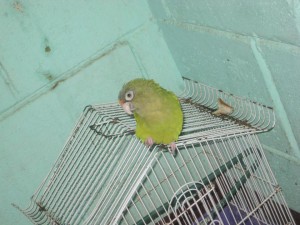
Chocoito! Gloria's pet parrot.
From this home stay, I saw the beauty of simplistic living. It is important that we take the time to find happiness with the people around us and in the things we do rather than objects and materials. I was also able to experience what it is like to live in a Nicaraguan community. Nicaraguans are kind, genuine people living together and looking out for one another in times of need, as we should all do with our own neighbors. This home stay has really been a great experience for me and I will forever be thankful to Gloria and the UNAN, Leon community for giving all of us this wonderful opportunity!
From this home stay, I saw the beauty of simplistic living. It is important that we take the time to find happiness with the people around us and in the things we do rather than objects and materials. I was also able to experience what it is like to live in a Nicaraguan community. Nicaraguans are kind, genuine people living together and looking out for one another in times of need, as we should all do with our own neighbors. This home stay has really been a great experience for me and I will forever be thankful to Gloria and the UNAN, Leon community for giving all of us this wonderful opportunity!
Ashley:
It might be that the times I have traveled before have been glossed over in my memory, but our day of travel to Nicaragua has been one of the hardest days of our entire trip for me. The flights seemed endless, I was sick, and ready to be in Nicaragua and truly begin our study abroad.
Prior to our trip, I had struggled through a difficult semester of classes and a challenging period of mental health struggles. I am quickly approaching my senior year and the prospect of life after graduation is scary to me. I have had life plans for as long as I can remember and I do not yet have concrete plans for after graduation. I wanted to participate in a study abroad because of the experience, learning, and exposure that it could give me that sitting in a classroom in Columbus, Ohio could not. I have been blown away by the group I am traveling with, our instructors, our guide, and every individual and organization who has given their time and resources to help create this experience. This trip has given me the opportunity to travel, learn, and gain immense perspective, and so much more. This trip is helping to mold my future and give direction to the decisions I will make. My experiences have been invaluable and I have been deeply impacted. The learning I have gained from this trip will make me a better social worker, professional, and human being. I am deeply grateful.
I have been to Nicaragua once before and upon arriving, things felt both familiar and very different. I was expecting the arrival to be comfortable to me- simply returning to a place I have had wonderful experiences before. The reality, however, was that my memories and the country before me were different. More accurately, I noticed that I was different than who I was in my previous travel, and this impacted what I saw and how I saw the country.
Typically I am quickly overwhelmed by pain and struggles of others. Though this has been the norm for me, it has taken me about a week to begin feeling overwhelmed on this trip, for many reasons. These reasons include nausea for days, heat exhaustion, intense sunburn, which seemed to numb me emotionally and mentally. One of my goals for the trip has been to stay engaged and actively reflect on all of the experiences we are having. Nonetheless, the week has as gone by quickly, experiences are beginning to run together, and I am realizing we are over halfway through the trip. I am loving Nicaragua and the realization that our time together here in the country will soon be over is saddening. I have loved every single one of the organizations and individuals we have met with. Though there is no way I could pick a favorite, our meeting with a woman named Juanita hit me with particular force. In other meetings I have been deeply moved and impacted by the speakers and their experiences and efforts, but Juanita's story this a morning moved me to tears. Though all women come from a long lineage of strong women before them (something else I have learned here in Nicaragua), Juanita's particular experiences as a transgender woman in Nicaragua have re-emphasized for me the human rights issues individuals on the LGBTQ+ spectrum have faced and continue to face all across the world. The violations Juanita faces every day prevent her from having the freedom to be who she is and force her to present herself to the world in an act that has distinct contrast to who she actually is. Her wisdom was profound to me, as she explained the importance of conversations about power, access to power, and inequality. Juanita also explained the power of "humanizing the struggle of others."
Later in the day, we finally returned to our hotel after a few more meetings with other people and organizations when I read yet another article about the issue some people have with transgender people using public bathrooms. To clarify, the issue I am identifying is some people's concern over the bathroom use of transgender people, not actual transgender people. I genuinely want to believe most people are uninformed about this issue, and not that they actually desire to oppress already marginalized people. Yet the issue stumps me, because the biggest issue seems to be a fear of being sexually offended in bathrooms, which has nothing to do with one's gender identity. To clarify, transgender people are people whose gender is different than their sex assigned at birth. Being transgender does not make one a sexual offender any more than being cisgender (being the same gender as the sex identified at birth) does. This means that people's fear is of sexual offenders, not transgender people, and the issue is resolved. The real issue was faulty logic and the issue is resolved, right?
Or does it really come down to people in positions of power using the false premise and excuse of fear to continue the pattern of oppression and the violation of rights of human beings considered "less-than" for one reason or another?
Welcome! We are excited to share with you some of our experiences from our study abroad in Nicaragua. We've just returned to Managua from our 4 days in Leon where we all enjoyed staying with families for 3 nights. We visited the public university, service agencies, and spent time with students and faculty alike learning about social work and the culture in Nicaragua. Enjoy our journey along with us!
Source: https://u.osu.edu/davis.2304/category/uncategorized/page/2/
0 Response to "Are Beans Considered Meat Funny Unan"
Post a Comment